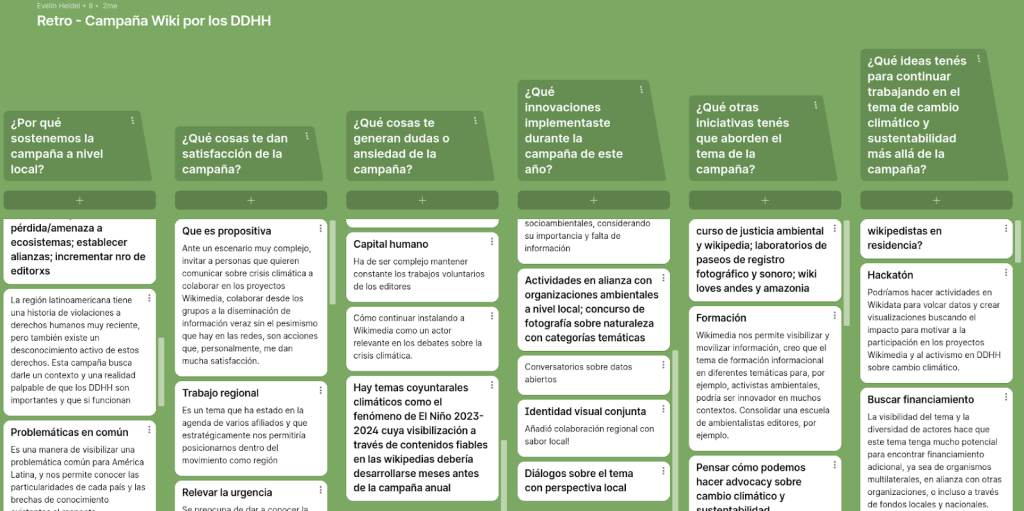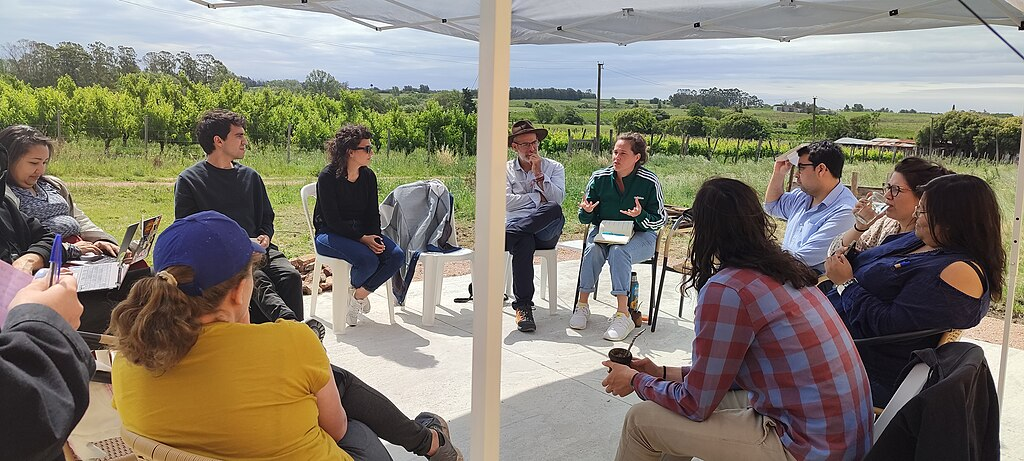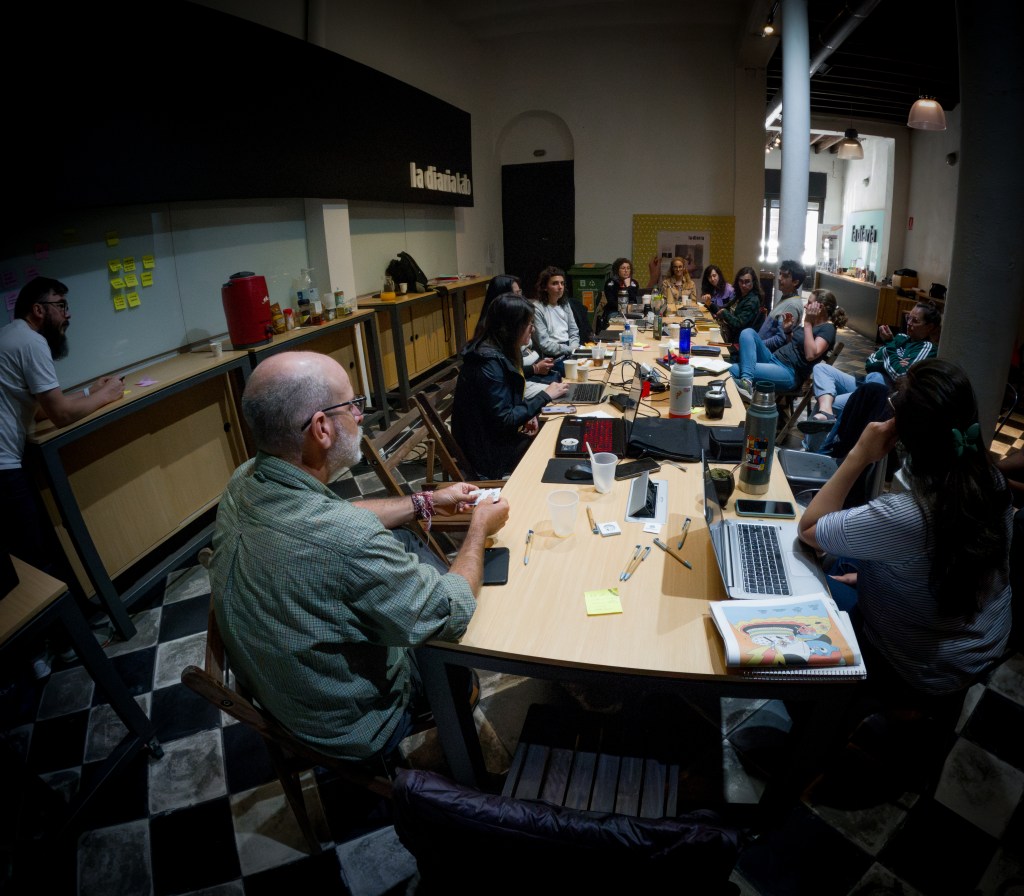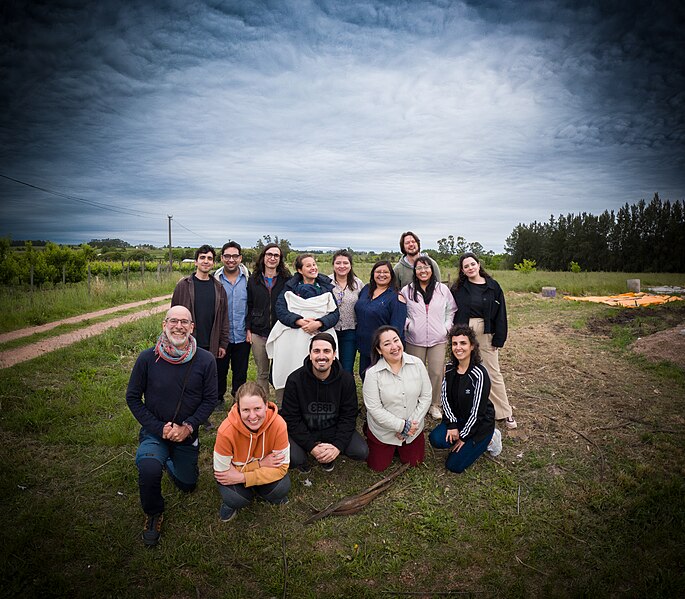Since 2022, Wikimedia affiliates across the Latin American region have been organizing the Wiki For Human Rights campaign, an effort that brings Wikipedia editors, diverse partnerships and allies (including environmental organizations) to add and improve content on Wikimedia projects on climate change, environmental topics and sustainability, with a human rights perspective. The Wiki For Human Rights organizers include Wikimedia Argentina, Wikimedistas de Bolivia, Wikimedia Chile, Wikimedia Colombia, WikiAcción Perú, Wikimedistas de la Universidad de La Plata and Wikimedistas de Uruguay, with the support of the Wikimedia Foundation.
This year, Wikimedistas de Uruguay received a grant from the Green Screen Coalition to “host a regional event in Latin America that will build bridges between Wikimedia communities, digital rights & environmental organizations to promote access to climate & sustainability knowledge.” This was an outcome of several events organized by the Green Screen Coalition, one that took place in Berlin in 2022 and one in Costa Rica in June 2023. In these events, the role that open can play in building a healthier information ecosystem to promote access to knowledge on environmental and climate change topics was explored by a group of open practitioners that included Wikimedians, longtime open data advocates and free and open software activists, among others.
This was the first time that this group of Wikimedia affiliates had the opportunity to meet in person since we started working together to bring to life the regional campaign Wiki for Human Rights: the right to a sustainable and healthy environment.
In the Uruguay face-to-face meeting in November 2023, we achieved the following:
- We established ourselves as a working group, with the intention to work together consistently throughout the year on other actions aside from the campaign.
- We established rules of participation, a plan for documentation, principles and goals for this working group.
- We drafted an action plan for 2024, that includes the collective implementation of the project “Green Citizenship in the Digital Space with Wikimedia projects”, developed in partnership with the IDB and the WMF; the 2024 Wiki for Human Rights campaign, that will coincide and complement the fellowship phase of the IDB project; and an international Conference focused on “Weaving Knowledge networks in South America: Climate Justice, Digital Rights and Indigenous Voices Wikimedia event in Huaraz, Peru”. These are milestones towards a larger plan to strategically get involved with COP30 in 2025, which will happen in Brazil.
- We met with other allies from civil society and academia to better understand their needs when it comes to communicating about environmental issues.
The tactic of the Wiki for Human Rights campaign was the main action that brought this group together for the last two years, helping us discover our shared needs and interests. With this meeting, we were able to consolidate our community of practice into a group with a shared agenda and a commitment to work towards a larger initiative. Our plan is to focus on more transformative actions that help us activate, collaborate with, and strengthen interested communities. Ultimately, we have come together to give visibility to the climate an environmental crisis in the open and free knowledge ecosystem, of which Wikimedia is a fundamental part, to prepare free knowledge for the knowledge needs of future audiences.
Building towards the in-person gathering
To maximize the benefits of in-person interactions, we allocated dedicated time outside our regular meetings for a three-part series of online calls in October and November 2023. The objectives of these virtual gatherings were to:
a) Reflect on our achievements and lessons learned thus far through our organization of the Wiki for Human Rights campaign.
b) Deliberate on future actions aimed at enhancing our work.
c) Consolidate the collective efforts of the group to date.
During these sessions, we gained a deeper understanding of our commitment to the topic of climate change and environmental issues. We explored innovative ideas implemented in this year’s campaign and outlined a set of new actions to focus on for the 2024 campaign.

This initial exploration allowed us to identify the main areas that we wanted to tackle in person: alliances, actions for 2024, and goals and governance for the group. As the second meeting progressed, the question about how we communicate what we have collectively achieved as a group, aside from our individual actions, started to be an important topic. This question needed to focus on issues around structure and ways of working, and allowing others to also be part of the initiative if they wish to do so.
To tackle this challenge, we set an online polling system to exchange ideas around shared goals, our long term strategy, and our structure to get ourselves organized (as a working group), and rules for participation. This allowed us to make some decisions effectively before getting together in person.
Getting together
With all this online preparation, we already knew that we had three big topics that we wanted to talk in-person: governance (including alignment on goals and principles), alliances, actions for 2024 and beyond.

For Day 1, we divided first into groups to tackle each of the big areas that we wanted to discuss. Then, we did a collective share out to explore what emerged as part of the discussions; one of the important things was to focus on the broader goals we wanted to achieve as a collective. This led us to discuss collectively on what we thought were our principles: why Wikimedia communities should work on the intersection of digital rights, climate change and environmental topics? How can we do it in a way that is respectful of the needs of those more impacted by it? What are the core values that unite us when it comes to disseminating information around climate change and environmental topics? Why is it important for us to have an intersectional and human rights perspective?
As an outcome of this meeting, we agreed on a rough set of principles (which will be expanded as the group progresses in the work). These set of principles bring important questions for discussion. As a way of example, one of the main focuses of the campaign has been to write biographies about environmental defenders, but how can we make sure that we’re doing it in a way that’s respectful and doesn’t further endanger them? This question is one of the actions we want to work on in 2024, to develop a policy of biographies of environmental defenders.

On Day 2, we met with allies from civil society and academia to do a sharing session. We had a set of initial ideas we wanted to explore with them when it came to dissemination of online information around environmental and climate change issues, and it was a fruitful conversation that revolved around how we can build trust in our information ecosystems when it comes to communicating about the climate and environmental crises.
After lunch, the allies left and the group focused on better defining our actions for 2024. We drafted an initial concept note for the Conference “Weaving Knowledge networks in South America: Climate Justice, Digital Rights and Indigenous Voices Wikimedia event in Huaraz, Peru”, which we expect that will take place in November 2024; decided on the topic of the 2024 Wiki for Human Rights Campaign (focused on environmental conflicts in Latin America); and we discussed the upcoming online course and internships with IDB on digital green abilities.
As the GLAM Wiki Conference organized by Wikimedistas de Uruguay was happening on the next days, we carved out some time to do a sharing session with Wikimedia Foundation leadership, Yael Weissburg (VP, Community Growth) and Selena Decklemann (CTO), where we exchanged about what the group had achieved with the meeting.
Finally, Carlo Brescia from Wiki Acción Perú presented our initial idea for the “Weaving knowledge networks” event in November 2024 in Huaraz as a lightning talk, available here.
What’s next?
Our online and in-person gatherings left us with some work to do. Right now, the working group is finishing up wrapping the following details:
- Choosing a name! We are in search of a name for the working group that is easier for others to understand.
- Defining principles and inviting others. We agreed on some general ideas around principles and rules for participation, which will be defined by February 2024. In the meantime, check our Meta page (in Spanish) for some initial ideas.
- Sharing and documenting our process and results. We will be running a Let’s Connect session in March to exchange ideas with the African affiliates working on the campaign, and we’re working on our Meta page, documenting past actions and long term goals and future actions.
- Help us by filling out the Conference Engagement survey. We want to meet again and build a larger coalition by organizing a Conference: “Weaving Knowledge networks in South America: Climate Justice, Digital Rights and Indigenous Voices Wikimedia event in Huaraz, Peru”, in November 2024. Help us by filling out the Conference Engagement survey.
- Building our 2024 and beyond actions! Over the next months, we will focus on our tactical agenda to build the Wiki for Human Rights campaign, the online course and internships on digital green abilities with IDB, and other actions we have lined up.
Wikimedistas de Uruguay is very thankful to Ariadne Foundation and the Green Screen Coalition for their support in bringing this event together, which we expect will have long lasting impacts on our communities.

Can you help us translate this article?
In order for this article to reach as many people as possible we would like your help. Can you translate this article to get the message out?
Start translation
